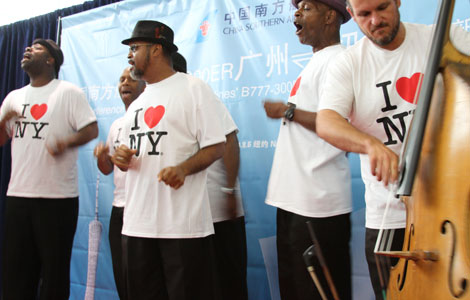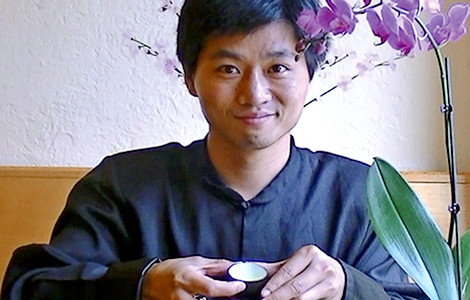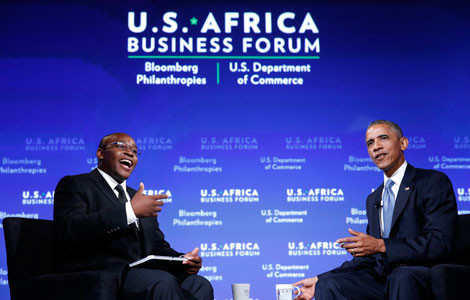Little Apple poses big psychological question
Updated: 2014-08-08 08:18
By Ke Han (China Daily USA)
|
||||||||
The Chinese media have been overwhelmed by a pop song, Little Apple, by the Chopstick Brothers. Called "brainwashing pop song" by many, Little Apple has become popular overnight in China like Gangnam Style or Tante (Perturbed) in the recent past.
All "brainwashing pop songs" have some common characteristics: they are simple and easy on rhythm, have straightforward lyrics and are fast paced. Little Apple has all of those and has become so popular in social media and networks media that even some official organizations are using it for promotion. For instance, the Ministry of Defense has posted a music video with soldiers dancing to this song on its official website to lure new recruits.
There are psychological reasons why simple songs top the charts, so to say, in no time. "Brainwashing pop songs" have appeal to us because of a psychological phenomenon called "earworm effect", which seems like a trick to our brains. In lay terms, earworm effect means the ceaseless repetition of a piece of music, often the chorus of a song, in one's mind. This recognition phenomenon of the brain is the reason why some simple pop songs "brainwash" us into accepting them as good pieces of music.
But the overwhelming popularity of a cultural phenomenon cannot be attributed only to a psychological phenomenon. Generally speaking, pop culture is characterized by novelty, easy accessibility and diffusion, and a large audience. The novelty of "brainwashing pop songs" is that it is fast paced. Such songs, however, are quite different from each other in rhythm and form to suit audiences' demand for novelty. The Internet helps spread these songs rapidly among a large number of people in the shortest possible time. And the songs' simple rhythm and lyrics guarantee that they appeal to an overwhelming majority of people who listen to them.
Pop culture expresses (or reflects) feelings common to the majority of the people and thus helps them feel relieved. Moreover, many people believe these songs' catchy but meaningless lyrics and pacey rhythm help them unwind, increasing their popularity.
It's interesting to note that another psychological phenomenon, group psychology, too plays a vital role in popularizing "brainwashing pop songs".
As social animals, human beings tend to get recognition and a sense of security from fellow groups. In pursuit of security and group identity, people end up copying others, a phenomenon that extends to all walks of life, from food, clothes and cars to travel destinations, films and songs.
As to pop culture, when a trend or phenomenon becomes immensely popular, it triggers a snowball effect: the more popular a trend is, the more easily can it attract more people. This is why media outlets and even some official organizations have fallen to the charms of Little Apple - to attract more people's attention.
Considering these psychological, social and cultural characteristics, the popularization of "brainwashing pop songs" is not surprising. "Brainwashing" popular trends, in different forms, are as old as human society. Sociologist, philosopher and musicologist Theodor Adorno has a pessimistic view about such "brainwashing" music. He says pop music is a standardized, de-individualized (but ironically publicizing individualization) product. The way the audience accepts pop music is mandatory and passive: many people are brainwashed by such songs because of social conformity pressure or the earworm effect. He also says people's aesthetics will gradually degenerate and become inactivate after they are "brainwashed" into accepting such music.
The question, therefore, is: Can human beings conquer their psychological inertia, or will they surrender to it? This is human beings' eternal rivalry with themselves.
The author is a psychological consultant and commentator.
(China Daily USA 08/08/2014 page17)

 Will Chinese tourists 'heart' New York too?
Will Chinese tourists 'heart' New York too?
 Mobile gamer iDream Sky raises $115m in IPO
Mobile gamer iDream Sky raises $115m in IPO
 China Southern launches Guangzhou-New York service
China Southern launches Guangzhou-New York service
 Chinese cadets' numbers rise in US military academies
Chinese cadets' numbers rise in US military academies
 US funded Chinese fashion website targets a new customer segment
US funded Chinese fashion website targets a new customer segment
 'Dr Tea' takes on the US
'Dr Tea' takes on the US
 NYC spurs small business
NYC spurs small business
 US-Africa summit starts with development fora
US-Africa summit starts with development fora
Most Viewed
Editor's Picks

|

|

|

|

|

|
Today's Top News
Pandas find friend in World Peace
Obama authorizes targeted airstrikes in Iraq
New Guangzhou-NYC flight 'a gift'
China's mobile gamer lists at Nasdaq
Will Chinese tourists 'heart' New York too?
Hagel in New Delhi to expand defense ties with India
Scale of Ebola crisis 'unprecedented'
Compromise called for in Sino-US ties
US Weekly

|

|







